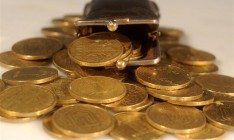Finance
TaxesCurrency exchange tax drove transactions outside the interbank exchange

In the period April to September 2014 a total of UAH 5.539 bn was transferred to a special fund of the State Budget in proceeds from the duty collected as compulsory state pension insurance in the process of purchasing hard currency (currency exchange tax), the Pension Fund informed Capital.
The Verkhovna Rada introduced a fee of 0.5% at the end of March having adopted a law submitted by the government on prevention of a financial catastrophe. Both individuals that buy hard currency from banks and companies and banks that purchase hard currency on the interbank currency exchange are obligated to pay this fee.
More harm than good
Proceeds from the collection of the currency exchange tax are one of the sources that cover the budget deficit of the Pension Fund. This year the difference between revenues and expenditures of the fund could reach UAH 18 bn. Revenues of the Pension Fund this year are planned at UAH 233 bn. A total of UAH 183.1 bn in revenues from all sources of financing have already been transferred to the budget fund.
Even taking into account currency exchange tax, this figure is still UAH 1.7 bn less than last year. The reason for the decline in revenues is the reduction in tax payments of Crimean citizens and certain territories in the Donetsk and Luhansk oblasts, the press service of the Pension Fund pointed out.
In order to fulfill the annual plan of own revenues and reduce the debts of taxpayers, the fund plans to “activate its work with the State Fiscal Service and local authorities”. “This is crucial since according to the results of nine months of this year a decline in the number of taxpayers that reported their incomes on behalf of ensured individuals and the number of employees was observed,” the fund reported. In connection with this, the value of currency exchange tax paid to the budget is extremely high. “The cancellation of the fee from foreign currency transactions requires a search for other sources to cover the budget deficit of the Pension Fund,” the press service of the fund stressed, though it did not specify what these sources could be.
At the same time, while covering the deficit, the tax from the purchase of hard currency has had an impact on the reduction in the volume of transactions on the interbank market. While at the end of March, before the tax was introduced, the total volume of transactions reached US $1 bn per day, over the past several months it barely reached the threshold of US $200 mn. The transactions shifted to the shadow market, which according to different assessments, is already five times higher than the official market.
“Because of the tax the financial institutions are not interested in actively working on the interbank exchange. Accordingly, this means the market is very thin and even petty transactions at less than US $1 mn can seriously affect the exchange rate,” analyst of the International Center for Policy Studies Oleksandr Zholud noted.
After the tax was introduced the speculative constituents of the market that allowed for certain maneuvers, disappeared from the market, NBU Governor Valeria Hontareva admitted earlier. In connection with this the NBU reviewed the possibility of creating an institute of market makers to support stable volumes of the interbank exchange. But later this initiative was rejected because introducing such a system on the market requires not only demand, but also supply of hard currency. Today, all banks are only geared towards the purchase of hard currency from the NBU, Hontareva explained.
The NBU is trying to convince the government to cancel the tax for banks and only charge end users, specifically importers. “This is an interim option. It is possible that charging the tax on cash transactions of individuals makes sense, meaning that it will apply only to cash exchange of hard currency, not the interbank exchange market,” Zholud believes.
Meanwhile, in seeking variants to fill the Pension Fund the government, on the contrary, intends to increase the size of the currency exchange tax by four times to 2%. This norm is already envisaged in the bill with amendments to the Tax Code. “If you want to escape from the hrynvia and hide under foreign currency, then pay the small tax,” Minister of Finance Oleksandr Shlapak commented.
Assistant Chair of the VR Social Policy and Labor Committee Pavlo Rozenko (UDAR), proposes leaving the current fee at 0.5%. “Undoubtedly, the Ministry of Finance is seeking additional financing for the Pension Fund,” says Rozenko. “However, the ministry and the government are not fully engaged in issues of de-shadowing of the economy. Instead, they choose the simplest solutions by proposing a raise in taxes,” he added.






 of the agreement of syndication with Financial Times Limited are strictly prohibited. Use of materials which refers to France-Presse, Reuters, Interfax-Ukraine, Ukrainian News, UNIAN agencies is strictly prohibited. Materials marked
of the agreement of syndication with Financial Times Limited are strictly prohibited. Use of materials which refers to France-Presse, Reuters, Interfax-Ukraine, Ukrainian News, UNIAN agencies is strictly prohibited. Materials marked  are published as advertisements.
are published as advertisements.